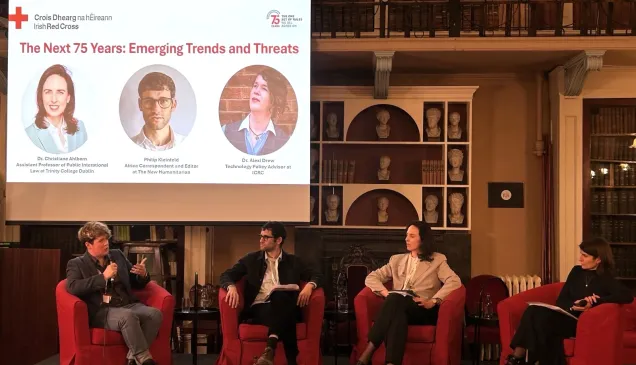High-level initiative on international humanitarian law
On 27 September 2024 Brazil, China, France, Jordan, Kazakhstan and South Africa together with the ICRC launched a global initiative to galvanize political commitment to international humanitarian law (IHL).
-
The overall goal of this initiative is first to make IHL a political priority, at global, regional and domestic levels. Secondly, it is to re-centre the debate about armed conflicts on the urgent need to set higher expectations by the international community to parties to conflict for the universal, systematic and faithful application of IHL; and thirdly, to start a process to discuss challenges on specific IHL topics, such as prevention of violations or conduct of hostilities rules, in order to make clear recommendations to address them.
The initiative will produce concrete and practical recommendations to meet these challenges. The work will culminate in a landmark meeting to uphold humanity in war by the end of 2026.
This year marks the 75th anniversary of the adoption of the Geneva Conventions. The Conventions have been universally ratified, and together with IHL more generally, they have proven over decades that, when respected, they can save millions of lives. Yet, ongoing armed conflicts are causing devastating human suffering and displacement. Violations of fundamental rules remain a serious concern.
Today, many feel that IHL is at a crossroads: as these challenges grow, the world must decide whether to reassert a strong and effective commitment to respect IHL. This initiative, launched by six states from around the world and inviting all states to join, seeks to give a strong impulse to bring hope and fight lethargy, because disregard for international humanitarian law is not inevitable. It can – and must – be overcome.
-
It is anticipated that the initiative will be composed of several workstreams, running in parallel. These workstreams will look at specific areas of IHL that are in need of deeper reflection and urgent action. They will involve consultations with states and experts.
The initiative will produce concrete and practical recommendations to meet these challenges.
Each workstream will have outputs that will be determined together with participating states.
The ICRC will set up working groups to engage in consultations. They will include states and, where relevant, other stakeholders, such as military audiences, national societies, academic experts, and others.
-
It is envisaged at the moment that workstreams would focus on issues identified as being of grave humanitarian concern in contemporary armed conflict, including galvanizing political commitment for IHL; strengthening prevention action (i.e. strengthening IHL implementation); protection of civilian objects and infrastructure; new technologies; protection of medical personnel and medical services; IHL’s contribution to peace; the challenges of contemporary naval warfare.
While there are innumerable areas where more can be done to improve compliance with IHL, it is important to prioritize to ensure meaningful progress in the time allotted. Additional workstreams could be considered after the high-level meeting to uphold humanity in war in 2026.
-
The initiative is not aimed at developing a new convention or a new mechanism. This initiative has a very strong focus on preventing violations of IHL and inciting more robust implementation efforts. In this regard, the clarification of IHL and the identification of good practices are crucial to achieving better respect for the rules.
This focus is not new. The ICRC is constantly engaged in activities related to improving implementation and preventing violations of IHL. This initiative seeks to bolster those endeavours by harnessing the political will and resolve of states and other partners to do more and to put respect for IHL back atthe top of the agenda.
-
Conflicts in recent years have put IHL very much in the spotlight. The initiative is not linked to any conflict in particular. We see recurring patterns of violations in many armed conflicts. We welcome all efforts to improve respect for IHL.
This initiative is not linked to any other conference or initiative that may be proposed or organized. It will not encroach on already existing platforms or formats/processes.
-
These six states felt that the current times called for a strong investment in international humanitarian law and decided to join forces together with the ICRC and invite the whole international community to work towards better protection during armed conflict. They are representative of different regions of the world and are members of a number of regional or international groupings and organizations.
-
All states are encouraged to join the initiative. This is about the universality of IHL, and it is hoped that the entire international community will come together to reassert their commitment to upholding the rules and principles of IHL. The states that launched the initiative will have a primary role in convening other interested states and in generating interest and active participation for the initiative.
Interested states can express their willingness to support and join the initiative by contacting the closest ICRC delegation through their capital or ICRC headquarters directly through their permanent mission in Geneva. Each interested state will be able to participate in the consultations and be active in different workstreams. There is no financial contribution requested from states in order to join the initiative.
You can also send an email IHLinitiative@icrc.org.
-
The ICRC has the mandate to work for the faithful application of IHL, for the understanding and dissemination of knowledge of IHL, and to prepare any development of IHL. Throughout its history, the ICRC has launched initiatives to strengthen IHL. This initiative is an additional endeavour launched by 6 states together with the ICRC, triggered by the stark observation that more needs to be done to increase respect for IHL and prevent violations.
The ICRC will organize the consultations, with the support of states and other partners, such as academic institutions or others. The ICRC will provide legal and technical expertise.
-
National Societies have an important role to play in disseminating IHL and in working with their governments on ensuring its respect. The ICRC hopes to see National Societies and their Federation supporting the initiative and will facilitate their engagement in the processes.
-
In the Pact for the Future, states expressed their commitment to protect all civilians in armed conflict and agreed to take steps to do so. We hope that this initiative will contribute to that goal and view it as complementary to efforts that may be undertaken in support of the Pact.
-
This initiative is independent of the International Conference. The International Conference of the Red Cross and Red Crescent Movement convenes every four years to discuss humanitarian issues, bringing together the Movement’s components (ICRC, IFRC and the National Red Cross and Red Crescent Societies) and the High Contracting Parties to the Geneva Conventions. The high-level initiative of course builds on the many discussions and achievements over the years at the International Conference with states, National Societies, and the IFRC.
Important discussions on IHL will take place at the 34th International Conference in October. The ICRC attaches great importance to the resolutions put forward on IHL at this year’s Conference. They represent a cornerstone in re-affirming the urgency of working toward greater respect for IHL.
This initiative exists alongside that work and proposes further ways for states to engage on IHL.
-
The initiative is meant to run over the course of two years, starting at the end of September 2024 and culminating with a landmark high-level meeting on humanity in war at the end of 2026.



